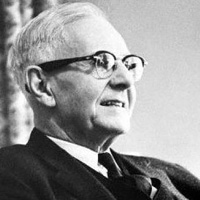John Crowe Ransom - Biography and Works
John Crowe Ransom was an American educator, scholar, literary critic, poet, essayist and editor, born in the family of Methodist father, John James Ransom and mother Sara Ella (Crowe) Ransom in Pulaski, Tennessee. Until the age of ten he did not go to formal school, instead he received an education at home.

John C. Ransom (1888-1974)
In 1899, he joined the Bowen School and studied there for four years. Then he attended Vanderbilt University at the age of fifteen where he studied philosophy taught by Collins Denny.
He is the founding father of a school of literary criticism called New Criticism. During the First World War, he assisted as the artillery officer in France. At the University of Vanderbilt he was appointed as the English teacher. After World War first, he returned to the university and continued his work. He was also among the founding fathers of the Fugitives, a literary group of sixteen Southern writer. It is the phase of his life where he started writing poetry and his first collection of poems are published as Poems about God in 1919. His other poems Chills and Fever and Two Gentlemen in Bonds are more mature in style and in theme. He wrote altogether 160 poems, hence, his fame as the poet just lay on these 160 poems. He even won the National Book Award in 1964 for his selected poems. The Fugitives started a magazine called The Fugitive under the editorship of Ransom which was a great success though for a very short time.
Ransom was more inclined towards the philosophy than the literature. He was the leading figure of the New Criticism, which received its name from the book of essay The New Criticism, 1941. Its prime focus is on the close reading of the text and its analysis based on the text itself not on the non-textual history. This new theory mainly influenced the American literature during the mid-20th century. His students Allen Tate, Cleanth Brooks, and Robert Penn Warren played main roles in developing the theory in full-fledged form.
